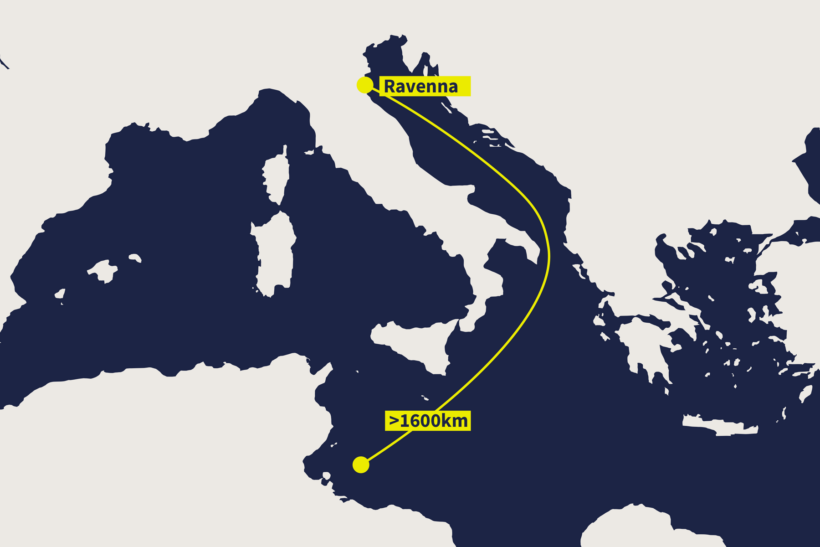The search and rescue organisations SOS Humanity, Mission Lifeline and Sea-Eye are taking legal action at the Civil Court in Rome against the Italian authorities’ systematic policy of assigning distant ports. The Italian authorities assigned Ravenna in northern Italy to the Humanity 1 as a place of disembarkation. The crew of the non-governmental rescue ship rescued 69 survivors in the central Mediterranean early on Thursday morning. Navigation to the distant port of Ravenna would place undue psychological and physical strain on the survivors, the Humanity 1’s captain emphasised. Furthermore, the Italian authorities’ practice contradicts international maritime law and will be challenged in court by the non-governmental search and rescue organisations.
On 20 April, around 2 a.m., the crew of Humanity 1 rescued 69 people including more than 15 unaccompanied minors from distress at sea in international waters off the Libyan coast. The port of disembarkation assigned to Humanity 1 at 3:30 a.m., Ravenna, is over 1,600 km away from the vessel’s position at the time of the rescue. The long navigation to Ravenna, despite other ports being much closer, risks the deterioration of the condition of the already vulnerable survivors.
The captain of Humanity 1 is deeply concerned about the physical and psychological well-being of the survivors on board the rescue vessel. He has therefore asked the responsible Italian Rescue Coordination Centre to reconsider the decision and instead assign Humanity 1 a nearby place of safety for a prompt disembarkation of the 69 survivors, stating:
“Not only must the place of disembarkation be safe for survivors, but also the route there. Currently, we have heavy seas with strong easterly winds. A 5-day journey to Ravenna would mean 5 days in rough weather until weakened, seasick survivors are able to receive the best possible medical care on land. One person was already unconscious by the time we rescued them, and many have hypothermia. A safe disembarkation could instead be guaranteed in a southern Italian port, which could be reached in just 1-2 days.”
SOS Humanity emphasises that the systematic assignment of distant ports by the Italian authorities since December 2022 is not in compliance with international maritime law. This stipulates that a place of safety should be assigned “with minimum deviation from the ship’s voyage” and that responsible Rescue Coordination Centres “shall arrange for such disembarkation to be effected as soon as reasonably practicable.” (1) Since December 2022, more than 20 unnecessarily distant ports have been assigned to non-governmental search and rescue organisations.
Alongside the search and rescue organisations Mission Lifeline and Sea-Eye, SOS Humanity is thus taking legal action against the Italian authorities’ systematic and illegitimate ‘distant port policy’. This clearly endangers the well-being of survivors of distress at sea and is aimed at illegally restricting the activities of NGOs.
Along with Humanity 1, the rescue vessels of Mission Lifeline and Sea-Eye were assigned distant ports in December 2022 and February 2023, respectively. In the case of Sea-Eye, many survivors were in a critical medical condition and one survivor died shortly after having been rescued. (2)
(1) 2004 Amendments to the International Convention on Maritime Search and Rescue (1979), IMO Resolution MSC.155(78), 3.1.9
(2) https://sea-eye.org/en/2023/02/






